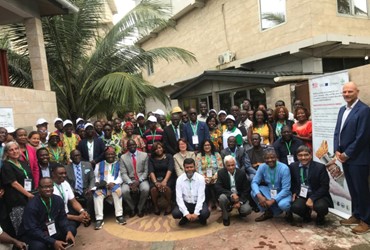The Seeds4Liberia Project officially launched in Monrovia, aiming to revolutionize agriculture in Liberia by improving key value chains, specifically rice, cassava, soybean, coffee, and fisheries. This initiative is financed by the European Union (EU) and led by AfricaRice in partnership with various local and international organizations. The project focuses on establishing resilient seed systems that facilitate enhanced seed production and distribution while strengthening infrastructure. It is geared towards providing Liberian farmers with access to high-quality seeds and necessary training to increase agricultural productivity, tackle climate change, combat pest issues, and ultimately achieve food security. The overall goal is to reduce Liberia’s dependence on imported foods and bolster local food production, aligning with the national development goals and enhancing the country’s agricultural base.
The event saw esteemed attendees, including members of the Liberian government and key figures from AfricaRice and the EU. The Deputy Minister of Agriculture, Mrs. Antoinette Dukuly, emphasized the crucial role of agriculture in Liberia’s economy, supporting approximately 70% of the population and accounting for nearly 39% of the Gross Domestic Product (GDP). She noted that the Seeds4Liberia Project would address significant challenges in the sector, such as the prevalence of uncertified seeds and deficient infrastructure for seed quality control. Through the production of sizeable quantities of certified seeds, including 6,000 tons of rice and 62,500 bundles of cassava seedlings, the project aims not just to bolster agricultural output but also to lay a foundation for food security and economic diversification in Liberia.
The EU’s commitment to agricultural development in Liberia was reiterated by Ambassador Nona Deprez, who highlighted the project’s alignment with the EU’s broader strategy for sustainable growth and food security. The initiative is designed to support the Government of Liberia’s “LIBERIANS FEED YOURSELVES AGENDA,” which is integrated into the National Agriculture Development Plan (NADP) for 2024-2030. The emphasis on high-quality, climate-resilient seeds reflects a determination to empower farmers, promote economic independence, and fortify Liberia’s agricultural future. The EU Secretary also pointed to the importance of involving the private sector in seed production, creating new avenues for local economic growth and opportunities.
Dr. Baboucarr Manneh, the Director General of AfricaRice, emphasized the project’s holistic approach to improving agricultural productivity through superior seed systems. He underscored that it represents a unified effort to foster food security and sustainable development in Liberia, not just by enhancing outputs but also by empowering farmers to counter various challenges like climate change. The Seeds4Liberia initiative showcases how collaborative efforts among organizations can lead to innovative solutions tailored to specific challenges within the agricultural landscape, reflecting an organized strategy towards long-term agricultural resilience.
Prominent structures involved in the project include AfricaRice, which leads the rice component, alongside the International Institute of Tropical Agriculture (IITA) focusing on cassava, soybean, and coffee, and WorldFish for the fisheries element. This integrated application of CGIAR centers exemplifies a well-coordinated effort to empower Liberia’s national agricultural research systems. The project is slated to broaden the capabilities of essential institutions, including the Central Agricultural Research Institute and the National Fisheries and Aquaculture Authority. By addressing existing gaps in seed production, certification, and distribution, Seeds4Liberia sets out to strengthen local agricultural value chains and decrease reliance on imported seeds.
Overall, the Seeds4Liberia Project is positioned for substantial impact, driving efforts to uplift Liberia’s agricultural sector through enhanced seed systems and comprehensive support for farmers. With strategic financial backing from the EU, collaboration amongst key local and international partners, and a firm commitment to fostering self-sufficiency, the initiative holds promise for significant advancements in productivity, food security, and economic diversification. As the project unfolds, it is anticipated to not only improve agricultural outcomes but also empower communities, thereby contributing positively to Liberia’s economy and the livelihoods of its citizens.


